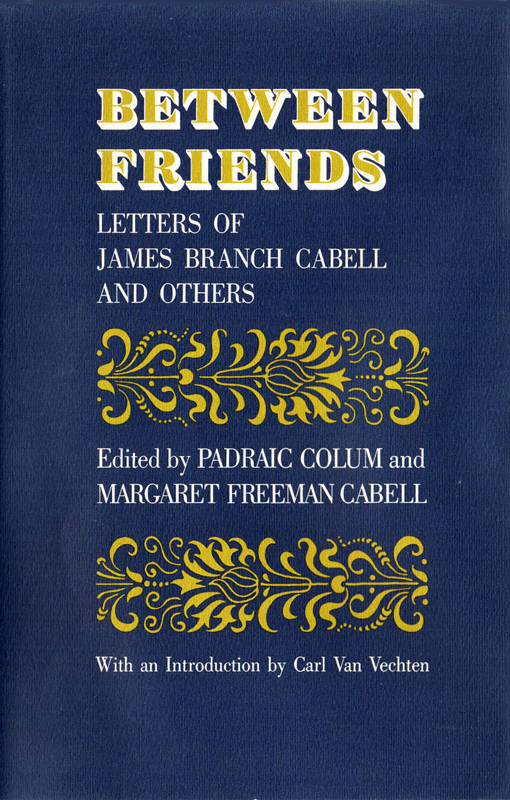Over the two year period from the seizing of Jurgen to Judge Nott’s final ruling, the case was much discussed in letters between Cabell, his editor, his friends and literary associates. Some of these exchanges were published in Between Friends: Letters of James Branch Cabell and Others, a collection edited by Padraic Colum and Margaret Freeman Cabell. (Harcourt, Brace and World, 1962). A few excerpts are reprinted here.

Image: Thorne and Lloyd, An Illustrated Bibliography of Works By and About James Branch Cabell
Robert M. McBride to James Branch Cabell.
New York, March 1, 1920
Dear Mr. Cabell:
After considerable inquiry I found the biggest lawyer in the United States on questions such as are involved in the Jurgen case. Not only is he an able lawyer, but an intellectual one as well, and his reading has been extensive. . . .
Quinn is a fighter and if there was any chance on earth of our winning the case and not losing it he would be disposed to go ahead, but he thinks it is hopeless from the start. You see the law doesn’t permit our introducing any evidence. No letters or opinions from literary experts are admissible, nor is it possible to have the author put on the stand to testify as to his purpose in writing the book. The book must be judged clearly on what it says and its influence on the jury. I think, you will agree, that the book will stand no such test. Its references when pointed out by opposing counsel will seem so obvious in their meaning that we cannot hope for leniency.
Guy Holt to James Branch Cabell
New York, May 8, 1920
Dear Cabell:
. . .I write this on blank paper because I want to emphasize the fact that the balance of the letter is entirely a personal one. Yesterday Q. telephoned us that his negotiations with our friends down town had been unsuccessful and that the matters is to be followed through with vigor and without mercy. It seems that the mention of Heaven and Hell has offended the religious sensibilities of one or two persons in power, and for this reason we are to be given no opportunity to promise to be good children in the future if they will pardon us this time. I am — I confess — glad that this is the outcome. It was to have been my unpleasant task to appear and explain what well meaning persons we are and how we never should have done it had we known, and certainly never, never would do it again. It is a role I did not fancy. Now, the prospect of a fight even with defeat certain is a comforting one and a sop to my rather undeveloped sense of honor. . . .
James Branch Cabell to Guy Holt
Dumbarton, May 11, 1920
Dear Holt:
. . . I refuse to defend Jurgen on any count: the book must speak for itself: and those who don’t like it can go to hell. So I am out with my platform before any of the political parties.
Letter from James Branch Cabell to Barrett H. Clark, Secretary of the Emergency Committee
1920
As to censorship of our reading matter, I concede this may, in theory, be advisable. In practice, though I can imagine no persons or class of persons qualified to perform this censorship. Pace the Vice Society, there is certainly a difference between pornography and fine literature, if but the difference that everybody enjoys the first where few care one way or the other about the second: and certainly the two should be appraised by diverse and appropriate standards. A work of art should therefore, in theory, be judged entirely as a work of art, by a jury of practitioners of the art concerned.
Garrard Glenn (lawyer for McBride and Holt) to James Branch Cabell following the acquittal.
New York, October 27, 1922
Dear Mr. Cabell:
I cannot tell you how much I appreciate your letter. It went so far beyond my deserts that I am almost ashamed to look it in the face; but nevertheless I am going to preserve it for my children. I feel that the whole occasion was an immense privilege for me; an opportunity to touch spaces and concepts that hitherto had rolled along far beyond the reach of my circumstances. I appreciate the memory, but I shall hold fast to the connection. . . . Now Jurgen is free, and I am therefore privileged to commune with its author; and I shall probably in the future abuse that privilege excessively.
Jurgen and the New York Society for the Suppression of Vice
PREVIOUS: The Judging of Jurgen by James Branch Cabell (1920)
NEXT: Jurgen In the News (1922)